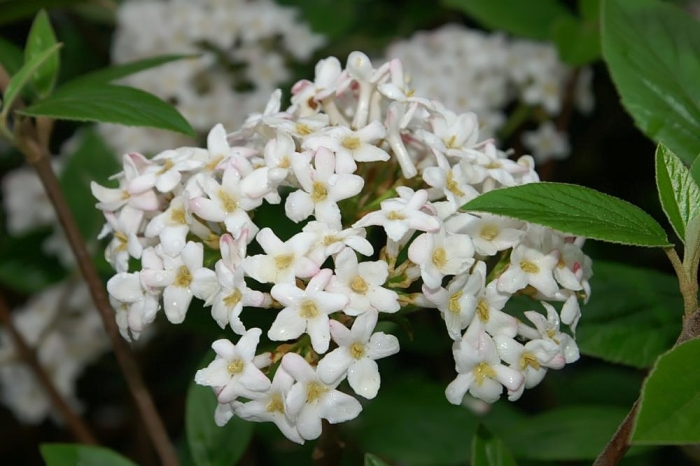Burkwood Viburnum
(Viburnum ×burkwoodii)
Burkwood Viburnum (Viburnum ×burkwoodii)
/
/

Photo by David J. Stang
CC BY-SA 4.0
Image By:
Photo by David J. Stang
Recorded By:
Copyright:
CC BY-SA 4.0
Copyright Notice:
Photo by: Photo by David J. Stang | License Type: CC BY-SA 4.0 | License URL: https://creativecommons.org/licenses/by-sa/4.0 | Uploader: David Stang | Publisher: Wikimedia Commons | Title: Viburnum_x_burkwoodii_Mohawk_0zz.jpg | Notes: User created page with UploadWizard |


























Estimated Native Range
Summary
Viburnum ×burkwoodii, commonly known as Burkwood Viburnum, is a deciduous shrub resulting from a cross between V. carlesii and V. utile. It is a hybrid of garden origin within the Adoxaceae family. It typically grows to a size of 2.5 meters (8 feet) tall and wide, featuring a rounded and dense habit that makes it suitable for use as a specimen or in shrub borders.
Burkwood Viburnum is valued for its glossy, dark green oval leaves and its early-spring flowers, which are highly fragrant and pinkish-white in color. The flowers are showy and often attract pollinators, followed by red fruits that mature to black, providing visual interest and food for birds. In cultivation, it is often used for hedging, foundation plantings, and as a focal point in mixed borders. It prefers full sun to part shade and requires medium water, thriving in soils with medium drainage. While generally easy to maintain, it can be susceptible to common viburnum diseases such as leaf spot and powdery mildew. Pruning is recommended after flowering to maintain shape and promote vigorous growth.CC BY-SA 4.0
Burkwood Viburnum is valued for its glossy, dark green oval leaves and its early-spring flowers, which are highly fragrant and pinkish-white in color. The flowers are showy and often attract pollinators, followed by red fruits that mature to black, providing visual interest and food for birds. In cultivation, it is often used for hedging, foundation plantings, and as a focal point in mixed borders. It prefers full sun to part shade and requires medium water, thriving in soils with medium drainage. While generally easy to maintain, it can be susceptible to common viburnum diseases such as leaf spot and powdery mildew. Pruning is recommended after flowering to maintain shape and promote vigorous growth.CC BY-SA 4.0
Plant Description
- Plant Type: Shrub
- Height: 8-10 feet
- Width: 6-7 feet
- Growth Rate: Moderate
- Flower Color: White, Pink
- Flowering Season: Spring
- Leaf Retention: Deciduous
Growth Requirements
- Sun: Full Sun, Part Shade
- Water: Medium
- Drainage: Medium
Common Uses
Bank Stabilization, Bee Garden, Bird Garden, Border Plant, Butterfly Garden, Deer Resistant, Fragrant, Hedges, Hummingbird Garden, Low Maintenance, Rabbit Resistant, Showy Flowers, Street Planting
Natural Habitat
Hybrid of garden origin within the Adoxaceae family, bred for horticultural purposes
Other Names
Common Names: Hybridolvon
Scientific Names: Viburnum ×burkwoodii , Viburnum ×chenaultii
GBIF Accepted Name: Viburnum ×burkwoodii Burkwood & Skipwith